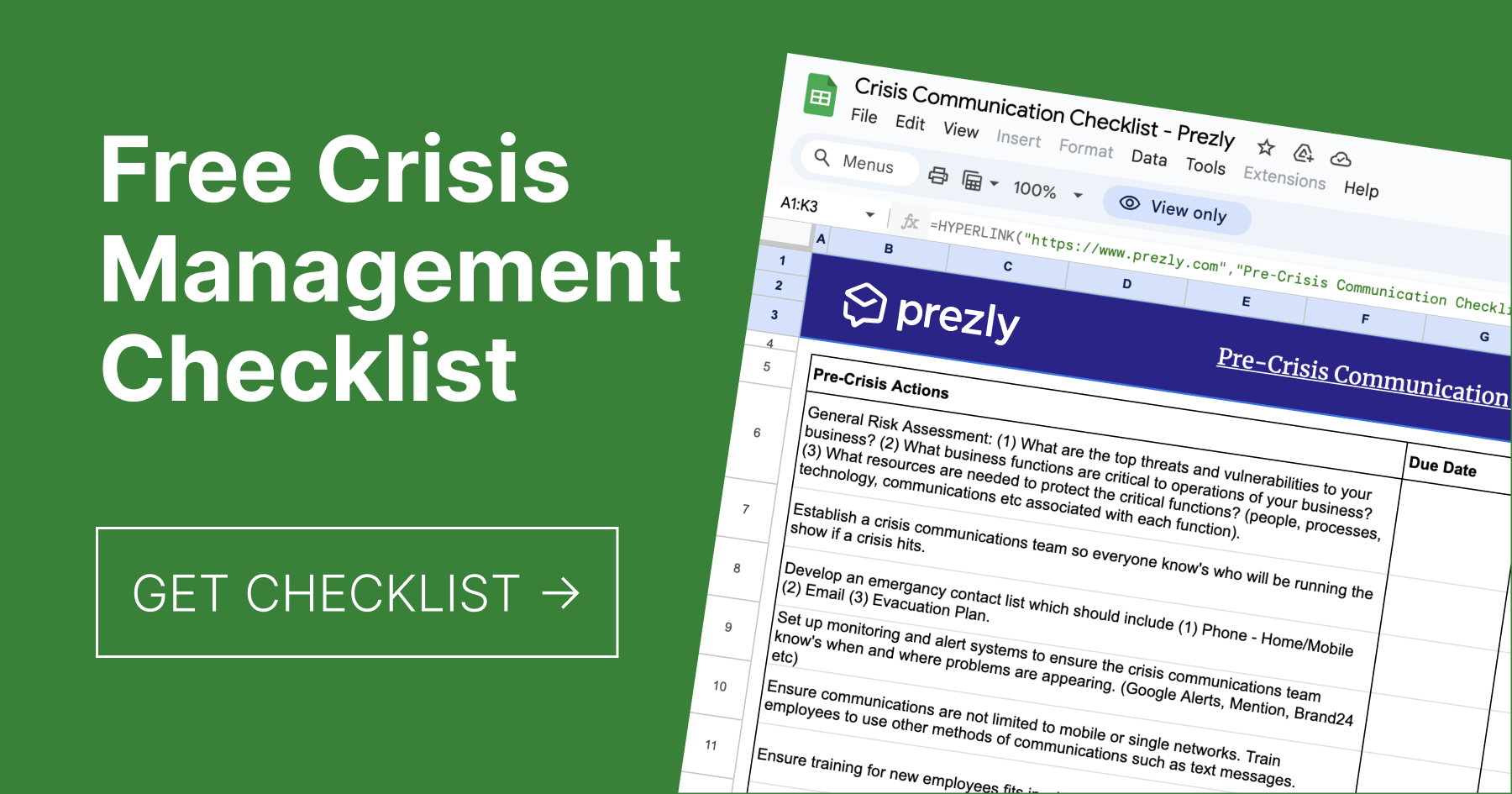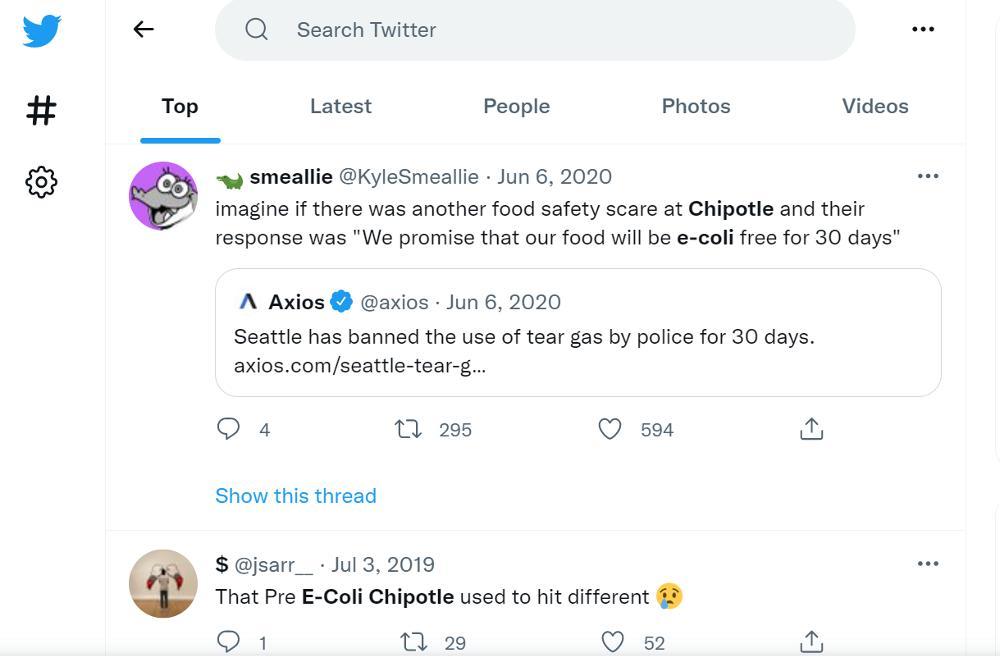What is Crisis Comms? Your Guide to PR Crisis Communication & Management (2025)
Or, what to do with all those lemons.
Crisis communication PR (or "crisis comms", for the time-poor) refers to the strategic dissemination of information during times of crisis. It generally includes the use of technology and channels such as press releases, social media (and social media press releases), crisis newsrooms, public statements, and interacting directly with stakeholders.
The aim of all crisis comms is to share accurate, timely, and relevant information with the public while mitigating the fallout on the reputation of the brand, organization, or individual concerned.
The definition of great crisis comms is fast response, accountability, addressing public (or stakeholder) concerns, and of course, transparency.
As you might imagine, that necessitates a certain amount of strategic planning and forethought.

While we seldom know exactly what fresh new hell stands lurking around the corner, we can make some educated guesses on its flavor and do some legwork to prepare accordingly.
A PR manager for an international airline might expect that their most likely crisis scenarios will be around weather-related delays, international relations, or – on the very far end of the disaster spectrum – a flight crash or malfunction. They might then sensibly prepare contact lists and draft comms based loosely on those scenarios.
The rabbit hole for crisis management communications is a bottomless one, so it’s up to you how far down you want to go. At the very least, here are the five key points you should consider.
Remember that customers aren’t the only people who need to be notified in a crisis situation. The list varies with sector and crisis, but it’s likely you’ll need to think about the following PR stakeholders:
- Staff and team members, potentially across multiple locations/languages
- Partners (business, not life) and anyone you work with, e.g. influencers marketing your brand
- The families of those affected
- The general public
- Media and the press
- Investors and board members
Think about every group of people that will be affected and create contact segments in your CRM system for each.
Figure out who your internal and external stakeholders are. They need to be communicated to first, they need to have crisis messaging pushed to them first.
You also need to consider who that stakeholder is. The messaging and method of communication is different for employees as it is to shareholders. So work on your stakeholders list and develop communications that will resonate with them best.
A key tip here is that your employees should be considered your biggest and best stakeholders. Consider how many social media accounts there are collectively talking about your brand thanks to your employees.
1 employee with 100 friends is likely to have more of a ‘viral’ effect than your paid push via promotion channels so try to focus on using this method to communicate with real-world users of your services/products.
Employees can communicate and spread news and messaging amongst their peers which can, hopefully, result in the network effect where your news will be spread for free and word-of-mouth.
In this day and age, social media is the go-to for most people when they want to know the latest updates fast, so it’s vital you have at least one social media channel ready to spearhead your crisis communication and response.
Other channels you should consider are email, your online newsroom and site announcements, and press releases.
Depending on your positioning, you might also want to set up a crisis comms newsroom. This is an online newsroom that stays private until you need to release it to the public, and includes things like key contact details and a log of updates on the developing situation.
Once you know which channels you’ll use:
- Set up press release distribution lists in all your chosen crisis communication methods
- Create guidelines for how each channel is to be used in a crisis, including pre-approved generic messaging and any processes around getting sign-of on statements
- Prepare statements, social media posts, darkrooms etc and have them signed off in advance
- Decide who will be responsible for what channel and brief them on your protocols
Prezly – software for modern PR teams
Write & publish brand stories in an online newsroom
Send email campaigns, pitches & newsletters
Manage all your contacts in a single CRM, with easy import & export
Measure performance with analytics & built-in media monitoring

The public has a knee-jerk reaction to any message that clearly comes from a PR team rather than from the people who are actually accountable for whatever’s happening.
Take, for example, the amount of backlash that Ashton Kutcher and Mila Kunis came under for releasing a clearly PR-orchestrated video in response to the public outrage following their comments around Danny Masterson’s sexual abuse accusations. TL;DR the public weren’t buying their sincerity.
People have a fairly reliable gauge for BS, and thanks to the internet, accusations and criticism spread like wildfire.
The way to avoid this? Don’t try to hoodwink your audience, and don’t let whoever you’re representing try to do it either.
By all means, prepare your spokesperson to speak with the public, but do not feed them a fabricated script intended to mollify and shirk responsibility. If they’ve prepared their own statement, insist on going over it with them and get to the bottom of where they stand and how that aligns with what the brand stands for.
A holding statement is a short pre-prepared statement that a company issues as news of a crisis is breaking. It acknowledges that there is an issue and communicates the next steps being taken.
That said, you do need to have some holding statements penned out in advance so you can start responding to the situation immediately. When crisis strikes, there will be some time before providing a response, the facts and details need to be delivered to the crisis team so that they can be dissected and swapped out with the variables you set in the planning stage.
This should be a rapid process with the proactive planning that you have been doing but a real-time statement release, in this case a holding statement, is vital to show stakeholders that you have acknowledged the situation and matter at hand.
In a crisis situation, you can have pre-planned holding statements ready to go live inside your company newsroom. Now this could be sitting in draft or it could be a dedicated crisis newsroom that goes live during a situation, either way you have an easy-to-access statement for anyone internally to access and set it live.
The purpose of a holding statement is to not grovel and plead for forgiveness but to simply acknowledge the situation, provide easy-to-access contact information and have a central location where updates can be added and viewed by stakeholders.
Remember, the point is to establish trust, provide clear guidance, and demonstrate accountability to the people concerned. The best way to do that is through honesty and action.
Your actionable bullets for this point:
- Identify who is directly responsible to your audience and make them your spokesperson (this may be the CEO, a head of security or other relevant expert, or the person most in the public eye)
- Prepare generic holding statements and have them signed off in advance
- When crisis actually hits, work with your spokesperson to align your messaging, and find out if there’s any dissonance, e.g. if their personal views clash with that of the brand

Crisis comms isn’t a one-way street. Part of being accountable and managing people’s panic during a crisis is to make yourself available to respond to questions from the public. How will you do that?
Again, social media is the clearest choice for timely response, but it isn’t without its risks – as they say, once something is on the internet, it’s out of your hands; there is no universal delete button. A simple poorly thought-out tweet can get you and your lemons in a lot of hot water, so the key thing here is to have a process and guidelines clearly hashed out beforehand.
Make sure you plan:
- Who is responsible for which comms channel
- What are the guidelines for what your representatives can and cannot say on behalf of your brand or client
- Who crafts the message
- Who has the authority to sign off on messaging and how this will be tracked
Ideally you will have a centralized PR tool where you can store all of your prep work, including contact lists (that you built yourself) and messaging.
Using a PR CRM tool that supports dynamic segmentation will simplify the process of maintaining up-to-date contact lists for your crisis comms, since these will automatically sync any updates – such as email addresses – to whatever contact segments you set up.
Similarly, preparing a crisis comms newsroom ahead of any potential problems will massively speed up your crisis comms rollout.
You can use Prezly's free trial to set up your crisis comms room and prepare your contact lists.
As well as having a reliable tool for getting information out, you'll want to employ software that will keep you in the know of any external developments as they happen. That means media monitoring and notification systems.
Back in the day there was a phone, email, fax and website as a notification portal for your stakeholders, now people are expected to have answers via social media in an instant, they feel really cheesed off if you don’t have a blog post up about the situation and so on.
In this instance, you need to clarify a plan that pushes out crisis communications to your stakeholders in the most efficient manner. Social media most probably being the number one method of notifications.
Now for monitoring systems. This can be as high-tech or low-tech as you want. It depends how quickly you want to know about the spread of a crisis within the media ecosystem.
Systems and platforms to consider include:
There’s also social media tracking, again this is where news spreads so pay attention to it, from free to paid platforms to test out. Have a designated user that is on top of all monitoring systems daily.
To kickstart your own crisis comms planning, grab a copy of this complete PR crisis management checklist on Google Sheets. Go to File → Make a copy or Download to make it your own.
.png)
Influencer marketing presents one of the best ways to reach out to and engage with consumers in real time during a crisis. Influencers are trusted, and research has shown the power of influencers over vital purchase decisions. Getting influencers to promote your product is now commonplace.
But influencer marketing isn’t just about going viral on social platforms. It’s about building an authentic relationship with your customers, connecting with a target audience, and telling your brand story. The PR and influencer marketing approach has also become an important part of most brands’ crisis management planning, and it's proving to be quite effective.
In this review, we discuss five ways an influencer network can help you deal with a PR crisis, and take you through a few examples of what a social media crisis might look like.
Crisis management in social media is the process through which a brand uses social media to address a crisis. Simple, right?
Although some crises can originate from social media, often the mess happens offline and then overflows onto social media as the public takes the story and runs with it.
An example:
Back in 2019, a Duke University freshman basketball player got a serious injury when his Nike shoes literally fell apart. This took place during a basketball game, and it didn’t take long before the whole story was on social media, riding a wave of attention from high-profile people like Barack Obama and LeBron James.
Zion Williamson seems like an outstanding young man as well as an outstanding basketball player. Wishing him a speedy recovery.
Needless to say, the crisis outpaced any damage control the brand's PR tried to do, and in fact went so far as to affect Nike’s stocks. That shows just how crucial crisis management is and social media's role during a crisis. That brings us to the next question.
Social media is a double-edged sword when it comes to handling a crisis, capable of resolving the situation or making things much, much worse, depending on how you use it. The vast number of people on social media means that a single wrong move can harm your brand's reputation in front of literally millions of vocal users.
Consider the 2019 case of Sephora. The brand was put on the spot by musician SZA when she tweeted that she was racially profiled while in one of their stores. As you might imagine, the post caused a social media uproar, with users reposting and commenting with their own similar experiences.

This shows just how quickly things can escalate if you are not swift to handle crises on social media; while a thoughtful, genuine apology combined with a plan to investigate the incident would not have negated the crisis, it would have at least demonstrated the brand's commitment to do better.
This section of the guide was written by Chris Norton, Founder of insight-led PR agency Prohibition, former University lecturer, author of “Share This Too”, and listed in the UK's top 10 PR and social media bloggers.
A good response to a crisis can show your brand’s commitment to looking after its community. It can turn a bad situation into good PR, helping you solidify your bond with your existing fans by showing your brand's true colors. But for that to happen, you’ll need to have a solid PR crisis management plan in place. And as it happens, influencers can play a critical role in that plan.
So, let’s now go through the five ways you can use influencers to help in a PR crisis on social media.
Negative comments or news stories about your brand can dominate the headlines during a PR crisis. This tends to happen when you take too long to respond or don’t take accountability and address the issue in good time.
By generating positive commentary about your brand and engaging your target audience, influencers can help shift conversations.
I was at the PR Week conference recently, and we discussed a campaign for which Adidas faced significant backlash. The campaign unveiled a new bra collection featuring a grid of 25 topless females with their heads cropped off. While some lauded the campaign as appreciative of different female body types, Adidas also received significant backlash for appropriating women’s bodies in a bid to go viral.
Adidas owned the campaign shared in various socials under the hashtags #SupportIsEverything and #impossibleisnothing. They reiterated that the campaign was meant to celebrate different women's body types.
It also moved past the negative sentiment and worked to improve awareness of its entire line of bras, enlisting the help of Indian influencer Mirabai Chanu to be the face of its Adidas India campaign on various social channels.

As a result, Adidas is now posting even stronger growth sales in several previously underperforming markets, including India.
Takeaway: Influencers can help shift the attention and conversations. But that’s not to say you shouldn’t own up to your mistakes. Before recruiting influencers to change the conversation, address the issue and show your commitment to fixing it. Then, you can bring in influencers to add positive vibes.
Even with an excellent website, good landing pages and a user-friendly app, you still need a way to drive positive traffic to your most relevant web resources in times of crisis.
That’s because when you search for a particular term, Google will sometimes provide a “top stories” segment near the very top of their search results. If your brand has been on the news and is trending on social media for all the wrong reasons, those negative remarks are likely to appear here. You don’t want that.
A timely and well-executed influencer marketing strategy can improve positive mentions and remarks about your brand. This increases social momentum as the influencer’s audience engages with the positive content.
It’s hard to believe that in late 2021, Britain’s #1 breakfast cereal – Weetabix – was facing a significant PR crisis that made headlines. Workers at the food giant partly downed their tools across various factories, causing a shortage of Weetabix. As a result, significant negative sentiment erupted around the Weetabix brand.
While the strike was resolved, Weetabix anticipated that negative conversations about the brand would still pervade online search items and mentions in the days and weeks that followed.
By partnering with content creators and micro-influencers from the food and lifestyle niches, Weetabix managed to ignite several viral moments on social platforms including Instagram and TikTok. In particular, the #WeetabixCheesecake viral challenge generated positive mentions for the brand.

Weetabix was also able to capitalize on its previously trending #BeanzonBix social campaign, which, despite the crisis, had been trending for much of the latter half of 2021.
The campaign cost Weetabix a little less than £5,000. The ROI was a success, and the Beanz on Bix campaign was crowned the best ad campaign for 2021 despite a tumultuous year for the cereal maker.
Writing better content for your brand and telling your stories organically is a key advantage of combining PR with influencer marketing. This, in turn, improves your brand engagement rate.
An influencer campaign effectively connects you with specific audiences on social media platforms during a PR crisis. Influencers can increase your brand’s likes, shares, reposts, comments, DMs, link clicks, hashtag engagements – pretty much everything.
High audience engagement rates generally mean that folks are interested in and interacting with your content. This is precisely what you want during a PR crisis; an engaged audience that's open to getting clarification on what's going on and provide feedback.
Walkers Crisps is an example of a brand that aimed to connect better with audiences on social media after a minor PR crisis. The brand’s 2017 #WalkersWave ad campaign was intended in good humor, and it did amuse me quite a bit. However, the campaign, fronted by football legend Gary Lineker, backfired after it failed to consider how people on the internet might try and have fun with it, and it ended up showing the star holding portraits of questionable characters such as Joseph Stalin and Fred West doing the Mexican wave. All a tad embarrassing.
"Are you sure automated tweets are the way to go?" "yes, people are sensible and will definitely not abuse it"
To quickly overcome the public relations backlash, Walkers’ strategy was to rejuvenate customer perceptions and engagements with the brand through influencer partnerships.
Walkers employed a multi-faceted approach. First, the brand, a darling of soccer fans in the UK, enlisted influencers from this circle. The most visible was influencer and journalist Reggie Yates, who fronted its #WalkersUnited and #SnapandShare campaigns across socials such as Snapchat.
The next strategy was for Walkers to enlist celebrity influencers, the Spice Girls, as the new face of the brand with the social media campaign #BestEverFan.
This campaign had a massive return on investment. A single live stream on Facebook generated an average engagement of 50%, with 36,000 comments, likes and shares, and hundreds of thousands of views.
When a public relations crisis hits, naturally, more people will look up your brand. And some of these people might not know anything about you. It’s therefore possible that they’ll view your brand negatively due to the PR crisis you’re facing. Any misinformation or negative press coming from the crisis will affect their attitude towards your brand.
Influencers can help you counteract that. A good influencer marketing campaign will help shed some light on what your brand is all about. Besides showing the good work of your brand, influencers may also help people who have never heard about you discover what your company does.
Snapchat faced mounting criticism in 2018 when the company announced sweeping redesign changes. Among many things, they wanted to condense their Stories and Discover features on a single page. Snapchat users were less than impressed, with some describing the new design as cumbersome and hard to get used to.
Initially, Snapchat’s CEO Evan Spiegel was bullish about the design changes and assured users that “they were here to stay”. However, after increased backlash, competition from a revamped Instagram, and a single tweet from Kylie Jenner that sent Snapchat’s shares tumbling, Snapchat backtracked.
In one tweet, Kylie Jenner wiped out $1.3 billion of #Snapchat’s market value! Talk about #influencermarketing. 😅
Besides resolving some of the UX issues on the app, Snapchat also conducted promos with some of the most famous influencers on the app. That included Cyrene Quiamco (CyreneQ), a digital artist, creative and influencer with over 200k followers. The influencers promoted the new design and increased awareness about the new product rollouts.
Influencers will not make a bad product good. However, influencer relationships can help rebuild trust with people amid a bad PR outlay.
Chipotle has been in the news since 2015, when the first cases of E. coli outbreak were reported at the giant Mexican-themed food retailer. Negative sentiment about Chipotle rippled across the company’s customer base of health-conscious food lovers. Lawsuits and sales slumps dogged the company through a rough couple of years.
A $50million advertising campaign on TV and sites like YouTube did little to salvage Chipotle’s image. Free coupons and giveaways didn’t help either.

But then Chipotle released a video ad (the Behind the Foil campaign) that took cameras inside its elusive kitchens, showcasing its “safety first” approaches. Besides the video-ad campaign, Chipotle further engaged digital influencers in a move that saw the company target Gen-Z and millennials, who had fast become its main target segment.
Under the #chipotlecreator program, various influencers from Facebook and TikTok produced content for Chipotle that would resonate with the younger generations, aiming to rebuild lost trust and create relationships that would drive up market share and help shape the brand's future.
In the spreadsheet, there is an additional tab for post-crisis review. It’s not lengthy, it’s not a soul-breaking process – it’s there to help evaluate and update processes. Most of us will shy away from this behavior because it means people, management, etc, are now scanning and looking for problems.
Assess, discuss and develop strategies around how to fix the issues witnessed and update potential scenarios that may occur.
This is part of being proactive too, you now have the facts and figures of how your company reacted, what the stakeholder reaction was, how the entire process was managed and what can be done to streamline the process.
You had your holding statements on standby – were they right for the situation?
- Did you need to adjust?
- If so, how much time was spent making changes?
- What additional statements should be created and why?
- Which journalists that mentioned the crisis need additional media relations work?
Once you have run through the assessment and review of how the crisis was handled, it’s time to implement changes and adapt your crisis communication plan to combat against any shortfalls you witnessed.
Assessment and review are all part of being proactive. It fine tunes your process and it helps your company deal with any crises in a far more efficient manner, limiting any fallout that would have otherwise caused additional damage.
From what can spark a crisis to how you can handle one once it's caught fire, there’s a lot to learn from the past experiences of other brands. So, here are three relatable examples of social media crises.
On 8 March 2021, the Burger King UK account tweeted something intended to raise awareness, but which backfired pretty terribly.

The tweet received so much backlash that even just a few seconds after going live, it was clear that the brand had got it all wrong. Luckily they didn’t hesitate to own up to the mess.
We hear you. We got our initial tweet wrong and we’re sorry. Our aim was to draw attention to the fact that only 20% of professional chefs in UK kitchens are women and to help change that by awarding culinary scholarships. We will do better next time.
This is a great example of a brand digging itself into a hole with an out-of-touch comment.
The Sephora crisis is all too familiar for most brands. It came about when a customer complained about an experience they'd had in their store. The worst part? The customer was the American singer SZA who had millions of followers and fans.
Lmao Sandy Sephora location 614 Calabasas called security to make sure I wasn’t stealing . We had a long talk. U have a blessed day Sandy
Sephora's PR team had some explaining to do. They replied to the artist, apologizing for what she went through. It’s also interesting to note that the beauty company started conducting inclusion workshops across its stores and distribution centers about a month after the incident.
Gucci came under fire when they released a product with a striking resemblance to blackface. Images of the Balaclava knit top found their way to social media, and the story spread like wildfire.
Today Gucci released their Balaclava Knit Top. Sigh. Really @Gucci? Really?
In their response, the brand was forced to apologize, and they immediately pulled the apparel from their stores.
This section of our article is written by Bram Boriau, founder of Talking Birds Public Relations.
The difference between a great brand and an average brand is the mindset of trying to make the most out of it and approach everything as an opportunity. Including a crisis.
There are a huge number of public relations benefits a crisis can offer to a brand, both during and after it occurs.
The key to success? During the crisis, you should always keep an eye on what will happen after the crisis.
As a PR professional, it’s your job to point out the opportunities that can be found during a crisis to your corporate customers or internal hierarchy. You should give them perspective and make sure they don’t lose hope or enthusiasm.
Let me give you some insights on how a crisis can become an opportunity.

Let’s get something straight: I don’t believe in the saying “all publicity is good publicity.”
A continuous flow of bad news will damage your brand and can have an enormous negative impact on your turnover.
The first crisis that your brand is going through, however, can be an entry point to better things to come.
Of course, much depends on the nature of the crisis in which you find yourself.
- Is it caused by ill-intentioned actions from employees?
- Is the cause internal or external?
- Are you just having bad luck?
But if you seize the opportunity to manage the situation in the right way, you can increase your brand awareness with a whole new group of stakeholders.
By being proactive, you can turn your crisis into a tool for reaching out.
You can benefit from the fact that your stakeholders are all ears, and believe me: they are. During a crisis– even more than ever before. Of course, they will probably be angry because of what happened, but you might just be able to grab their attention long enough to develop future projects.
And true, they might be emotional, but their attention span is long right now because they are actively looking for information.
In a few B2B cases, your B2B stakeholders will want to give feedback to their customers and stakeholders. They will appreciate the fact that you are “open” and will be reaching out to them: this will prove to their own customers and stakeholders that they’re important enough to be listened to.
A well-known example was Belgian telecom leader “Telenet,” that embarked on a tour to visit all their customers after a small PR crisis. “Worldline” (a leader in e-payments) turned a crisis into an opportunity to tighten the relations with the Belgian trade federations, after a major e-payments failure.
A crisis is also an opportunity to increase your Twitter followers. The initial reason that you will gain more followers is due to the crisis itself, and some will fade away after the crisis is over.
But the chances are that some followers will stick around, stay connected, and interact with your content in a more positive way.
Remember the movie classic Casablanca? The relationship between Rick Blaine and Captain Renault started with a crisis, but in the end, it became the beginning of a beautiful friendship.
Needless to say, well-balanced and active social media relations during a crisis are key to building long-lasting stakeholder engagement.
Admit it: you’re an adrenaline junkie. If you weren’t, you wouldn’t be a PR professional. Nothing wrong with that.
Adrenaline gives you the energy to do great things. For many PR professionals, crisis communication is a raison d’être. Of course, they’re stressed, but they will also admit that crisis communication is one of the reasons that they love their job.
So, enjoy it while you can: this is (hopefully) one of the rare moments you’ll feel this sort of energy.
On the downside: In my experience, some PR professionals tend to enjoy the crisis feeling a bit too much. They can put aside their tedious day-to-day tasks and bask in the glory of the spotlight.
Very little research has been done on this topic, but it’s my personal belief that some sort of… I like to call it, “Stockholm Crisis Communication Syndrome” exists: wherein a crisis might be prolonged because PR professionals secretly enjoy it a little too much.
People
During a crisis, you’ll discover the true strength of your colleagues. Will they break under pressure? Will they be able to keep their cool? There’s no way to hide the truth: this is the moment when things need to get done. You’ll discover both the best and the worst in the people with whom you are working.
Of all the moments of a crisis, it’s the now that counts. Darwin would probably call it the survival of the fittest.
You’ll have to perform and prove that you can do what you’ve been trained to do. If you don’t, it means one of two things:
- You’re not fit for the job, or
- Your methods are not performing as they should.
Keep this in mind and see it as an opportunity for improvement in a post-crisis evaluation.
Organization
Many organizations don’t have clear crisis communication guidelines. They see this as the umbrella they’ll never need. A crisis really pushes your organization to its limits and can be a starting point to shape your future crisis communication strategy.
As a communications manager, all eyes are on you during a crisis. You’ll have an unseen internal platform, potentially even bigger than the one your CEO has.
Take advantage of this. Manage the crisis well, turn it into an opportunity, and it will enforce your internal position and give you opportunities to grow your career.
But beware of possible envy from your colleagues. There’s a lot of internal stress during a crisis. And everyone knows that when it’s all over, reports and evaluations will be made. So, the coin might flip over to the other side: your colleagues might use your highly visible actions to cover up their failures and put the blame on you.
“Dear CEO: This situation is the ultimate proof that we need to develop an online newsroom.”
Or maybe…
“Dear CEO: I’ve always said that we need to work on our social media presence. This crisis shows that not having any is damaging to the company. Let’s work on this after this is all over.”
But whatever you do, don’t be the “I told you so” guy or girl. No-one likes a smartass, and it’s not productive.
Publish your own newsroom in just 5 minutes
Create a fully branded, multimedia, multi-language newsroom right now with a 14-day free trial of Prezly, no payment info required.

Let’s use an example of an HR-related crisis: You’re firing a lot of people, and the media are on it. If firing these people will not have an impact on the quality of the services or products you’re delivering, you’ll have a huge platform to push these messages.
You’ve got a direct line to your potential clients to inform them that your product will be more accessible because you’ve cut labor costs. It’s hard. But it’s true.
You should consider that although you’re not scoring any points with the bigger audience, you have a unique opportunity to send your message to a well-targeted portion of the public. Of course, smart messaging is key in this.
Prezly – software for modern PR teams
Write & publish brand stories in an online newsroom
Send email campaigns, pitches & newsletters
Manage all your contacts in a single CRM, with easy import & export
Measure performance with analytics & built-in media monitoring

by Bram Boriau, founder of Talking Birds Public Relations
Ah yes, the great Belgo-Dutch ‘egg crisis’ of 2017. This is just another example of how being prepared for a crisis in terms of communication, and having the right mindset, is crucial to managing your reputation properly.
The Belgian food protection agency was slow in terms of communication, and it communicated in a highly bureaucratic and defensive manner.
We see this very often. When corporations or governmental organizations are hit with a crisis, they waste crucial time due to unstructured processes and a fear of “communicating too early”. Let me tell you a little secret: there is no such thing as “there is nothing to communicate about.”
Being a corporation or governmental organization comes with responsibilities toward the public. One of these is that the public is completely entitled get an update or to be alerted when there is a potential risk. If you fail to do this from the moment you were aware of any risks, they will rightfully blame you for not being transparent and responsible.
Ask yourself this key question: will public opinion pardon us when they find out that we knew?
From the moment you even have any doubts about the answer, you should prepare a communication.
The general public does not expect that you will have all the answers right from the start. Your first communication should be about acknowledgment and showing that you are on top of things. Indeed, recommendations on behavior will also be expected. There are always ways of doing this, even with little information.
Let me share with you the template for a so-called ‘holding statement’ that can be used in the first phase of a crisis.
Acknowledgement:
[ Organization name ] has become aware of the fact that [ what has happened ].
Reassurance:
We have mobilized our teams in order to gather more information about this / to resolve this issue / incident / crisis. You can be assured that we are doing everything we can to resolve this.
Recommendation:
Based on the information we have right now, we recommend our [ relevant stakeholders ] do [desired action ]. Based on the information we have as of right now, nothing indicates that the public should be worried.
The – very cliché – ground rule in crisis communication is: be prepared. Make sure that you have your template statements ready. Work on procedures.
Download this template as a PDF →
The key in crisis communication is speed. You have to take advantage of the first ‘golden’ hour. You must communicate before anyone else does it for you, and spreads messages you don’t control.
Believe me, you don’t want to waste time composing press lists based on old Excel files, or getting frustrated due to the fact that you don’t understand why Outlook isn’t doing what it is supposed to do.
With crisis communication, it makes your life abundantly easier to have the right tools in place. Consider if a problem arises, do you then draft a press release and send one-by-one or BCC to your contacts? What if that BCC, due to the elevated situation, becomes a CC and now you have another problem on your hands.
Get a system in place with some drafted templates for situations you could see arising.
The best time to make friends is when everything is working as it should.
Answer this question honestly: who would you rather support? The person you haven’t heard from in ages, or the friend you see from fairly often?
It always surprises me how much empathy organizations or corporations expect from media and the public, when they didn’t make any effort at all to maintain relations in tempora non suspecto.
Will this always make a difference?
No. You may be surprised to see how few real friends you have, but even acquaintances will be more understanding during a crisis if you’ve maintained a good relationship with them beforehand.
Communication professionals working internally for a company or organization risk getting drowned in a situation.
They can lose the clear view of the events and themselves in details, and can get into a very defensive attitude.
One can easily prevent this by consulting externals. It’s a matter of focus. I can recommend contracting professionals that have a reputation for clear speech. You don’t want someone who will only confirm what you presume, you want a consultant that will also tell you what you don’t want to hear.
Too often, when companies mess things up in terms of operations, they’re admitting “communication errors”. This is an often-heard strategy to distract the public from the fact that errors were made in terms of operations.
It’s a bargaining game: let’s see if we get away with blaming it on the communication strategy and not on the operations. If journalists and the public accept this, it might calm down the storm. If they don’t, it might work against you.
In the Fipronil egg-crisis in Belgium, the “communication error” excuses were made a couple of times. I consider communicating properly on food safety a crucial task of a public organization.
The main errors the Belgian food safety agency made in terms of communication were that they weren’t prepared, had no tested tools and statements, and were focused too much on themselves and not towards the general public.
They tried to get away with the ‘communication error’ strategy, and failed to see that the public did not accept this excuse.
As PR crises are an almost inevitable part of business operations, staying one step ahead of the curve is crucial. Influencer strategies can turn the tide for your business or brand when facing a public relations crisis.
But a successful crisis strategy isn’t just about putting out fires, it’s about preventing them from flaring up in the future. The key is preparation.
Once you’ve gone through all of the above points, assemble all of your prepwork in one doc or handbook and make sure that everyone that needs to know, knows where to find it. (It’s up to you what you use for this, though personally I find Notion excellent for this sort of thing – no affiliation, I just genuinely like it, and there’s a free version.) Make sure your handbook gives contact details for all relevant parties, yourself included. Revisit it at regular intervals so that it stays up to date.
Crisis communication is about sharing information during emergencies with the aim of mitigating damage and restore trust in your brand. Good crisis communication prioritises values like honesty, transparency, and accountability.
The 5 C's of crisis communication are: Coherence, Control, Candor, Concern, and Commitment.
A crisis communication plan is a structured PR strategy for how an organization communicates during an emergency. It's important because it ensures quick and coordinated communication, maintains trust, and reduces the risk of damage to reputation.
A crisis communicator needs to assess the situation, develop a strategy, craft and disseminate clear messages, monitor feedback, coordinate with stakeholders, and maintain trust.
Prezly – software for modern PR teams
Write & publish brand stories in an online newsroom
Send email campaigns, pitches & newsletters
Manage all your contacts in a single CRM, with easy import & export
Measure performance with analytics & built-in media monitoring

Ready to start growing your media reach?
With Prezly you can publish press releases online, and share them directly with journalists. 14-day free trial, no credit card required.












